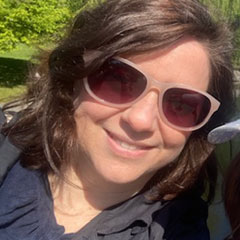Chloe Wigston Smith, Senior Lecturer, English and Related Literature
Chloe is Senior Lecturer in Eighteenth Century Literature in the Department of English and Related Literature (where she serves as graduate chair) and the Centre for Eighteenth Century Studies.

Her interdisciplinary research and teaching draw on her postgraduate degrees in English and the History of Dress. Chloe is a Fellow of the Royal Historical Society.
email: chloe.wigstonsmith
Our 60 seconds interview with Chloe:
Could you please tell us what work you do in the field of mental health?
I’m a specialist in eighteenth-century women and material culture, and the intersections among culture, literary history, gender and maker’s knowledge. My research considers how craft supported wellbeing and women’s education in the historical and print record.
What do you find most rewarding and inspiring in this work?
Women’s crafts testify in moving ways to how material culture supported those who found themselves at the margins of society. Craft was (and is) a form of knowledge, community, financial sustenance, and offered multiple ways for makers to speak expressively and creatively.
What is the most challenging or complicated aspect of this work?
A piece of handiwork is often the one thing that marks a woman’s place and time in the historical record, but so many of these pieces are missing their fuller histories and the identities of their original creators. Some handiwork made by Black and Indigenous girls in North America exemplify the complex and terrible histories of dispossession, empire, racism, and oppression.
What impact do you hope your work is having - or can potentially have?
Eighteenth-century makers relied on craft for wellbeing and to mark their place in the world in fabric and thread; their approaches to handiwork, I hope, hold potential for understanding craft practices today and how material objects might connect us to the past, present, and future, to support wellbeing and individual, creative expressions.
Could you share with us one piece of advice that you follow for your own mental health?
I find that taking a break from work and chores to get outside is a crucial form of support (no matter the amount of time or location); I wish I could say that this often takes the form of weeding in my allotment, but alas it does not.